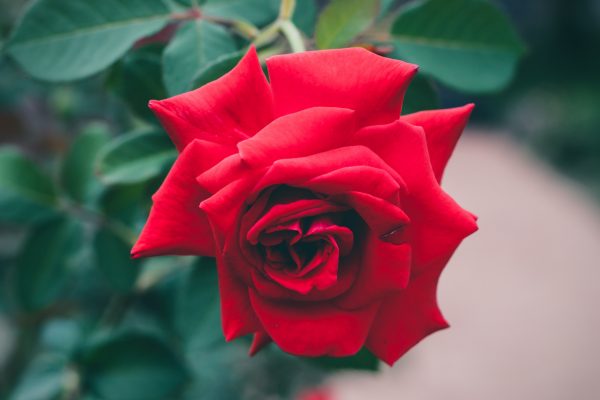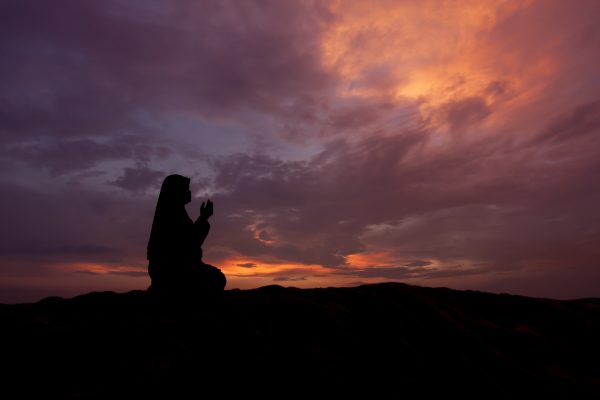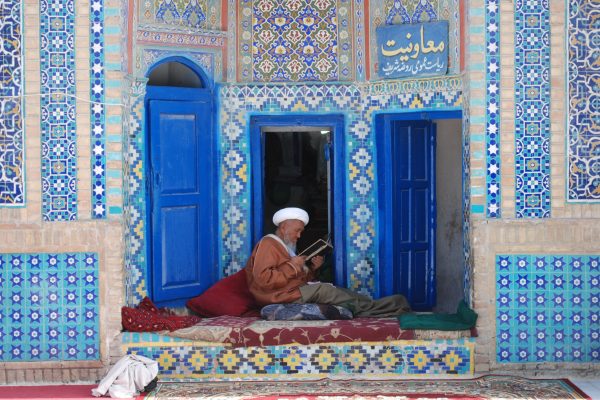I began to run, looking for water, looking for Zamzam for my baby. I began to run faster and faster between Safa and Marwa asking Allah to help my baby. Please let me find water. It was at this point that I stopped, right in the middle of everyone, and could not believe what was happening. I literally was reenacting what Hajjar did.
I began to run, looking for water, looking for Zamzam for my baby. I began to run faster and faster between Safa and Marwa asking Allah to help my baby. Please let me find water. It was at this point that I stopped, right in the middle of everyone, and could not believe what was happening. I literally was reenacting what Hajjar did.
Life is seldom foreshadowed for us like in a work of fiction. We usually have to wait to understand the significance of an event. So, when it happens in real life, it holds your attention transfixed. For months my dreams were filled with images of Ibrahim (AS), Hajjar and the desert, and the sweeping expanse between Safa and Marwa. I tucked the dreams away in the folds of my mind with little expectation.
Soon after my family and I received an invitation to attend Ummrah, all expenses paid. It was an invitation extended to several convert sisters living in the United Arab Emirates. It was a once-in-a-lifetime opportunity, but I was not traveling alone.
When the idea was first proposed to me, I was anything but enthusiastic. The idea of traveling with a ten-year-old, eight-year-old, six-year-old, five-year-old and a nursing six-month-old, during Ramadan in the middle of summer, was daunting. My five children and their father would all embark for Ummrah together.
I thought about all the extra clothes, piles of diapers, and a ready supply of snacks I would need to pack – contemplating dragging five children around Saudi Arabia while attempting to perform Ummrah was not how I envisioned this spiritual journey. I was focusing so much on what could go wrong, and yet, I did not want my children or me to miss out on such a great opportunity and a few of the women joining us volunteered to help me. We were living in Dubai and the opportunity may not come again, so I agreed.
In my experience, I’ve found that if I just let go, and rely on Allah, everything has a way of unfolding in the most incredible way. I knew that if Allah was planning this trip, I did not need to worry. I also knew that with the help of Allah, enough diapers and baby’s on-demand food supply (me), and a little help from my sisters in Islam anything was possible. So, I prepared the family for the journey.
I wanted to experience something great and out of the ordinary when we walked out the front door – and it was with this sentiment and a strong desire to connect with Allah that I set off for Ummrah. Flying into Madinah, it was apparent to me that there was something special about this trip. I had hoped for this to be a special trip, but I didn’t want to start reading anything into this yet. However, at the risk of sounding cliché, the visit was dreamlike. I moved around Madinah as if surrounded by a gossamer haze. My children loved being in this blessed city, mashAllah, and didn’t fuss, not even the baby.
The day I entered the masjid of the Prophet (swa), I was filled with such joy and elation. I was finally going to meet the Prophet (swa), the man who had occupied so much time in my dreams. No one could understand what this moment meant to me. I walked slowly and softly, tears in my eyes. I was hoping something would happen. Would the ground shake? Would I hear his voice? I did not know, but I was there and I wanted to savor the moment so I could remember its taste for the rest of my life. While everyone around me rushed to the Prophet’s (swa) grave, I crept slowly, trying to stretch the time.
I felt like it was only he and I. Everyone else seemed like ghosts or beings occupying a parallel dimension. It was only Rasul Allah (swa) and I.
I hoped I was not going to be a disappointment to him. I stood in front of his grave as the crowd swirled around me and the guards rushed them by. I said asalaam alaikum and prayed for his family. I wanted to thank him (swa) for being my friend when I was alone. I wanted to tell him how much he meant to me, but all I could do was cry softly because I knew he already knew. What words could I say anyway? I stood there for as long as I could, the crowd, the guards, and my children moving me on, but it felt so special. I was visiting an old friend and inshaAllah I would again. Did anyone else feel this way? Did it matter?
We took a bus to Makkah a few days later. I was a bit tired, well, I was very tired, and the baby was constantly nursing, but fatigue would soon be lifted. The tops of the minarets of the Kabbah came into view. You could not help but openly sob, your body filled with a surge of energy and purpose. Here we were, fulfilling the deepest desire of every Muslim; you had to be grateful. The duaa you say as you approach Makkah are almost frantic – you do not want to waste one moment to pray after you see the Kabbah.
We arrived at about two in the morning. The group decided we would sleep for a bit and perform our Ummrah after fajr prayer. We slept for literally a few hours because we had to eat suhur before fajr. I prepared my daughters and my husband helped our sons get ready. Before we left, I put the baby in her backpack and put her on my back for the first part of our Ummrah.
You hear horror stories about people’s negative experiences in Makkah, but everyone was so polite to us. Even the Makkah policeman called my daughter habibati as he asked her to move out of the way. Three of my children would perform their Ummrah without me. They were with sisters that were traveling with us, but as a mother, I still needed to keep then in my sight. There were not too many people at this time and the summer heat was not yet upon us. I tried to concentrate, but I do have to admit that I kept looking for my children. At one point the kickstand to the baby backpack came out and I was turned around in a circle by the mass of people. Someone eventually put it down and I could walk straight ahead again.
My five-year-old was also with me. I remember her little legs moving quickly as she kept up with me. I kept whispering into her ear how good she was doing. Towards the end I saw how hot and tired she was. At that point, she looked up at me – “help me” was written all over her face. I thought what can I say, I cannot pick her up, I have the baby on my back. Oh Allah, what can I say to encourage her these last few steps? I told her, “After we finish, habibati, I will buy you anything you want.” Her face lit up and she charged ahead, al hamdulillah.
I prayed two rakka in front of Kabbah, but I was hot, and my back was aching. I felt a bit dazed by how many people there were and wondered how I could keep track of all my children. So, I prayed, there was nothing else I could do. I am still amazed at how smoothly the trip went and how I had the strength physically and mentally to deal with everything. This was Allah’s mercy.
We went to perform the last part of our Ummrah, the part between Safa and Marwa. The baby now went to her father. I started to say my duaa as soon as we started to move. I whispered to my children what they should say. After we completed two circuits, I noticed the baby did not look well. I touched her hand and she did not respond. I touched her cheek; she was very hot. I told her father I would bring Zamzam water inshallah. I went to each waterspout, but they were empty, it was Ramadan.
I then went in the direction of Safa and checked the rows of water faucets, but no water. I walked faster to catch up to the baby. I said to my husband, “there’s no water, but I’ll try again.” I touched the baby’s cheek and her head flopped to the side; her eyes were listless. This was not good, but all I could do was pray that she would be ok. There was no way to leave. I began to run, looking for water, looking for Zamzam for my baby. I began to run faster and faster between Safa and Marwa asking Allah to help my baby. Please let me find water. It was at this point that I stopped, right in the middle of everyone, and could not believe what was happening. I literally was reenacting what Hajjar did.
I knew this was a special moment, something that did not happen all the time. It was what all mothers do. We fight for our children. We work for them, even to the extent of neglecting our worship of Allah. I knew I had to make a choice then; what was I going to do? I could not let my baby die, but I also could not neglect my worship or lose this opportunity to perform my Ummrah properly.
I began to run as fast as I could, but I said my duaa as I did, and as I did, I felt a real sense of purpose. I had to finish my Ummrah and go get Zamzam for my baby. It was another fifteen minutes before I could get the Zamzam water to her. When I did I said “Safaki allho afaki,” may Allah heal you, into the cup. Within seconds she was fine.
As I ran between Safa and Marwa I was reminded that even though I am a mother, I am still a woman and I had to find a balance between the two. Life is about finding balance, about the choices we make and how we respond to the obstacles we face.
All too often society asks women to make sacrifices. It is expected. Women sacrifice to become mothers and as mothers, we continue to make sacrifices for our children. Our role is important and many times our contributions are undervalued by society because we are seldom honored as women by our Muslim communities. This needs to change in order to build healthy and strong societies to replace the brittle and weak communities this Ummah has become. We need to remember the sacrifices of Ibrahim (AS) and learn from them while implementing them into our lives. As mothers, we are all Hajjar in search of Zamzam water for her child. As Muslim women and men, we are called on to sacrifice, in big and small ways, to make a strong Ummah.
Our choices not only define who we are, but they also define what the Ummah is. Our Ummah is collapsing one person at a time, one family at a time, one community at a time, and country by country. Islam can no longer only be a collection of rituals we perform with no connection to our private and collective lives. It needs to live in each of us and be our guide if we hope for Allah to change our situation. We are all running between Safa and Marwa right now, looking for Zamzam, that thing that will heal us and bring us life and comfort.
The foreshadowing did not lay in my pre-Ummrah dream, but instead in pointing to the tremendous changes that were about to happen to my family and I. It was a message that would serve as my guide in the days and years ahead. It was a comfort during an extremely painful and lonely time and a reminder that Allah would send the help when I needed, just as He helped Hajjar in her time of need. Islam and life are about sacrifice, but it is also about trusting in Allah’s plan and putting in the work – saying bismillah and tying your camel.





